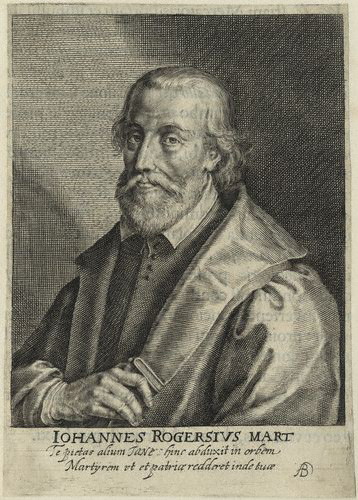In 2006 Nicole Blackman created a walking tour of Digbeth called “Stay Away From Lonely Places” that was inspired by the true and not-as-true-as-they-could-be stories of Digbeth- stories that I only half remember involving a lost ring, a Hell’s Angels Wedding, warring industrialists and the possible site of the first English Martyrdom of the Marian Persecution: John Rogers- bible editor, bible translator, bible commentator and martyr. Blackman reflected that “Marian Persecution” would be a good rock band name, I vividly remember on the corner of Floodgate Street and High Street Deritend reflecting that it would be a great name for a drag queen- you can take that fact to the bank. Blackman was unsure the Birmingham Civic Society had it right saying that Rogers had been martyred in Birmingham, it was Smithfield in London. Already Rogers’ story is getting away from me; I’ve spoiled it by giving away that he dies at the end burned at the stake.

John Rogers was born in Deritend, educated at the Guild School of St John the Baptist in Deritend (now the Crown Pub on the High Street) and at Cambridge University. In 1534, Rogers went to Antwerp as chaplain to the English merchants of the Company of the Merchant Adventurers. (Has ever a Guild of merchants ever been more excitingly named?)
While Rogers was in Antwerp he met William Tyndale and abandoned his Catholic faith. Tyndale had published his English translation of the New Testament in 1526 and together Rogers and Tyndale took advantage of the recent technological and theological breakthroughs: Caxton’s printing press sped up the process of production and dissemination; Rogers and Tyndale drew their translation directly from Hebrew and Greek texts and their project was driven by the quiet fires of the Martin Luther’s Protestant Reformation.
Later in his life Rogers was radical against “pestilent Popery, idolatry and superstition” but he was also radical towards Protestants. When Rogers was asked by John Foxe to intervene with the case against Joan of Kent he said that burning was “sufficiently mild” for a crime as grave as heresy. With the ascension of Mary to the throne and the shift to Catholicism as the faith of the nation Rogers found himself under scrutiny. Following questioning Rogers was sentenced to death for heretically denying the Christian character of the Church of Rome and the real presence in the sacrament and was burned at Smithfields on 4th February 1555.
All through telling this story I’ve had a still small voice nagging me saying “So what? Why should I care?”
The reformers were reacting to the corruption they perceived to be at the heart of the church in Rome. The reformers wanted to tear the Church apart and start again, they wanted to put the word of God at the heart of the Christian faith and put the word of God into the hands of ordinary people. It wasn’t about a priest in a pulpit mediating your relationship with the divine; here was an opportunity for you to open a book in your own home and read the words that spoke the universe into being, flip a few pages and there were the words that were spoken to Moses as the law, flip a few pages more and there were the words Jesus spoke to his disciples telling them to love their neighbour as themselves. Words not chanted by Monks on your behalf behind a screen, not intoned by a priest from a pulpit, a priest that could be corrupted with money but with words you spoke with your family on a day to day basis. The reformation was a triumph of literacy, of the printing press and the spoken word and John Rogers, the guy from Birmingham who burned both figuratively and literally for his beliefs, was one of the key players.
